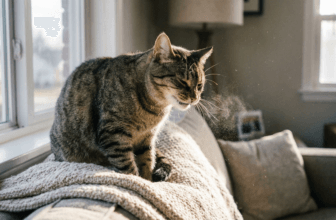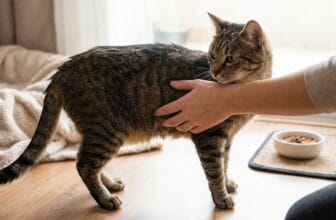
Table of Contents
Imagine your cat suffering from a serious condition without showing any signs. Kidney disease is a big problem for many cats, especially as they get older. But, with the right care, many cats can still live happy lives. So, are you ready to help your cat’s kidneys stay healthy?
The kidneys are key to a cat’s health, filtering waste, controlling fluids, and making hormones. If they don’t work right, cats can feel very sick. They might drink more water, lose weight, or eat less. Knowing about kidney disease in cats is important to help them feel better.
What is Kidney Disease in Cats?
The kidneys are vital organs in a cat’s body. They remove waste, regulate fluids and minerals, and make hormones. These hormones help make red blood cells and control blood pressure. Unfortunately, cat kidney disease, also known as feline kidney disease or kidney disease in older cats, can occur in two main forms: acute and chronic.
The Role of Kidneys in a Cat’s Body
The kidneys do many important jobs in a cat’s body. They filter the blood, removing waste and excess water. This waste is then excreted as urine. They also help keep fluid balance, blood pressure, and red blood cell production right. If the kidneys don’t work right, it can cause health problems for your cat.
Types of Kidney Disease in Cats: Acute and Chronic
- Acute Kidney Failure: This type of kidney disease happens suddenly. It can be caused by toxins, trauma, or infection. Acute kidney failure is very serious and needs quick vet care.
- Chronic Kidney Disease (CKD): CKD gets worse slowly over time. It’s more common in older cats. CKD is the final stage of many diseases and can be caused by many things, like infections or immune disorders.
Knowing about the different types of kidney disease in cats is key to caring for your cat.
Symptoms of Kidney Disease in Cats
It’s important to know the signs of kidney disease in cats early. This helps in getting the right treatment quickly. The symptoms can change based on how severe the disease is.
Common Signs of Kidney Failure in Cats
Cats with kidney disease might drink more water and pee more often. They could also lose weight, have a bad coat, and eat less. Other signs include mouth sores, feeling tired, and being sad.
As the disease gets worse, cats might vomit, have diarrhea, and feel weak. They might also have bad breath because of waste in their blood. These signs are important to watch for.
Some cats might also have swelling or problems with their vision. This is because of high blood pressure. Spotting these symptoms early can help get your cat the care they need.
“Recognizing the symptoms of kidney disease in cats is crucial for early detection and intervention.”
Quick action can help if your cat has acute renal failure. But chronic kidney failure needs ongoing care. Knowing the signs can help your cat get the right treatment.
Causes of Kidney Disease in Cats
Kidney disease is a common issue in cats, affecting their health in many ways. Knowing what causes it helps pet owners prevent and manage it better.
Toxins like antifreeze or certain medicines are big culprits. Severe infections, trauma, or blockages in the urinary system can also cause sudden kidney failure. On the other hand, chronic kidney disease (CKD) often comes from long-term health problems.
- Cats born with kidney issues, like polycystic kidney disease, are more likely to get CKD.
- Immune system problems, viral infections, and cancer can also lead to CKD.
- Inherited conditions, such as amyloidosis, are linked to kidney failure in cats.
Sometimes, it’s hard to find out what causes kidney disease in cats. Regular vet visits and early action are key to managing this disease. They help keep cats with kidney disease living well.
“Kidney disease is one of the most common conditions affecting older cats, with over a third of senior cats being affected.”
Understanding the many causes of kidney disease in cats helps both pet owners and vets. Together, they can prevent, detect early, and manage this serious condition effectively.
Diagnosing kidney disease in cats
Diagnosing kidney disease in cats requires a thorough check-up by your vet. They will run blood and urine tests to see how well your cat’s kidneys are working. These tests help figure out the disease’s stage and plan the best treatment.
Blood and Urine Tests for Kidney Disease
Your vet will first check your cat’s blood urea nitrogen (BUN) and creatinine levels. High levels mean the kidneys are not working well. They’ll also look at your cat’s urine specific gravity, protein levels, and for any abnormal cells or substances.
In some cases, your vet might suggest imaging tests like x-rays or ultrasounds. These help find out if there are kidney stones or tumors causing the disease.
Staging Kidney Disease in Cats
Your vet will use the IRIS system to stage your cat’s kidney disease. This system goes from Stage I (early) to Stage IV (end-stage). It helps decide the right treatment and how to keep an eye on your cat’s health.
It’s very important to catch kidney disease early and start treatment right away. By working with your vet and understanding the tests and stages, you can help your cat get the best care.
“Microalbuminuria testing is recommended when routine urine protein tests are negative and in cats at high risk for kidney disease or to detect hidden illnesses.”
How Kidney Disease Affects Your Cat
Kidney disease can deeply affect your cat’s health. As the kidneys fail, waste builds up in the blood. This leads to symptoms like weight loss, poor coat, and less appetite. Cats may also vomit, get dehydrated, and have anemia, high blood pressure, and vision problems.
The disease can progress slowly. At first, your cat might drink more water and pee more. But as the kidneys fail, these efforts don’t work as well. Knowing how kidney disease affects your cat is key to their care and quality of life.
| Symptom | Impact on Cat |
|---|---|
| Weight loss | Decreased muscle mass, weakened immune system, and overall poor health |
| Poor coat quality | Dull, dry, and unkempt appearance due to reduced grooming ability |
| Decreased appetite | Leads to further weight loss and malnutrition |
| Vomiting | Disrupts fluid balance and can cause dehydration |
| Dehydration | Affects organ function, including the kidneys, and can exacerbate symptoms |
Kidney disease is complex and needs careful management. By understanding its effects, you can work with your vet. This helps your cat live a longer, happier life.
Treatments for Kidney Disease in Cats
Managing kidney disease in cats needs a mix of diet changes, meds, and support. The main goal is to fix the root causes, balance metabolism, and make your cat comfortable.
Dietary Management for Kidney Disease
Diet changes are key in treating kidney disease in cats. Cats with kidney issues do well on a low-protein, low-phosphorus diet. It should also have vitamin D and omega-3 fatty acids. These cat kidney disease diets ease the kidneys’ work and boost function.
Medications and Supplementation
Your vet might also give meds and supplements to help with kidney disease in cats. They might use phosphate binders, anti-nausea meds, and blood pressure meds. Adding potassium, B vitamins, and red blood cell boosters can also help.
Subcutaneous (SQ) Fluid Therapy
As kidney disease in cats gets worse, SQ fluid therapy might be needed. This involves giving fluids under the skin at home, with vet guidance. SQ fluids help keep your cat hydrated and support kidney function.
The right treatment for kidney disease in cats depends on the disease stage and your cat’s needs. Working with your vet, you can create a care plan for your cat’s kidney health.

Life Expectancy for Cats with Chronic Kidney Disease
The outlook for cats with chronic kidney disease (CKD) can change a lot. It depends on the disease’s stage and how well treatment works. Sadly, once kidneys are badly damaged, they can’t get better much. But, with the right care, many cats can live a good life for years.
Cats in the early stages of CKD (Stages I and II) might live for months or years. Research shows cats with Stage II can live at least a year after being diagnosed. Some studies say they might live up to two or three years.
Cats in later stages of CKD (Stages III and IV) face a tougher road. But, with the right care, they can still live for months or even a year. Cats in Stage III might live about 679 days. Those in Stage IV, with severe symptoms, might live only about 35 days after being diagnosed.
Early detection and careful management are key to a cat’s life expectancy with kidney disease. Older cats with CKD might also have other health issues. These can make their prognosis for cats with chronic kidney disease even harder.
It’s important to check a cat’s quality of life when thinking about their life expectancy for cats with kidney disease. Watching if they still enjoy food, activities, and being around people helps. If a cat’s quality of life drops a lot, even with treatment, it might be time to consider euthanasia.
In short, the life expectancy for cats with kidney disease can be quite different. But, with the right care and focus on their quality of life, many cats can live for months or years. Catching the disease early and acting fast is key to helping a cat live a long and happy life.
“Palliative care aims to slow disease progression and manage symptoms in cats with mild to moderate CKD, while hospice care focuses on maximizing a cat’s quality of life when the disease progresses and symptoms worsen.”
Preventing Kidney Disease in Cats
Keeping your cat’s kidneys healthy is very important. Up to 80% of older cats may get chronic kidney disease (CKD). While some kidney problems can’t be stopped, you can lower your cat’s risk.
One key way to prevent kidney disease is to keep your cat away from harmful substances. Things like antifreeze, cleaners, and some medicines can hurt their kidneys. Make sure your cat can’t get to these dangerous items.
Good dental care and managing health issues like high blood pressure or thyroid problems can also help. Cats might eat up to 20 small meals a day. Feeding them a balanced diet that meets their needs can help their kidneys stay healthy.
Regular vet visits are crucial for catching kidney problems early. Cats should see the vet once a year as adults and twice a year after they turn 7. Early treatment can really help, as most kidney damage happens before symptoms show up.
By being proactive, you can help your cat avoid kidney disease. This way, your cat can live a longer, healthier life.
kidney disease in cats
Early detection and action are key in managing kidney disease in cats. In the early stages, cats might not show any clear signs. This is because their kidneys can handle a lot before showing problems. But, tests like the SDMA blood test can spot kidney issues before traditional tests like BUN and creatinine.
By catching kidney disease early, vets can start treatments. This can slow the disease’s progress and keep your cat’s life quality high. Regular vet visits are crucial, especially for older cats. They help catch and treat kidney problems quickly.
Early Signs of Kidney Disease in Cats
- Increased thirst and urination
- Weight loss
- Poor appetite
- Vomiting or nausea
- Lethargy
If you see these signs in your cat, see a vet right away. Early action can greatly improve your cat’s health.
| Diagnostic Test | Significance |
|---|---|
| SDMA (Symmetric Dimethylarginine) | Identifies kidney dysfunction earlier than traditional BUN and creatinine tests |
| Blood Urea Nitrogen (BUN) and Creatinine | Measures waste products in the bloodstream, which can indicate kidney problems |
By catching kidney disease in cats early, you can help your cat live better. Regular vet visits are key to early detection and treatment of this common condition.
Types and Causes of Acute Kidney Failure
Acute kidney failure in cats can happen quickly, often in days or weeks. This acute kidney failure in cats usually comes from a clear cause. Causes include toxins, severe infections, trauma, or issues with blood or urine flow.
Some common reasons for sudden kidney failure in cats are:
- Eating antifreeze, lilies, or certain medicines
- Bacterial kidney infections
- Blockages that stop urine flow
- Shock or dehydration from severe vomiting or diarrhea
Older cats face a higher risk of acute kidney injury (AKI). Signs of AKI include not wanting to eat, feeling tired, vomiting blood, diarrhea with blood, bad breath, ulcers, low blood pressure, abnormal heart rate, seizures, changes in urination, and shock.
Some cases of acute kidney failure in cats can be fixed if treated quickly. But, without fast action, it can get worse and be deadly. Doctors diagnose it by looking at the cat’s history, symptoms, blood and urine tests, and imaging.
Treatment for AKI includes IV fluids, fixing the underlying problem, and supportive care. The cat’s chances of recovery depend on the cause and how much the kidneys are damaged. Infections usually have a better chance than toxic causes.
“Acute kidney failure in cats can rapidly progress and become life-threatening without timely intervention.”
Types and Causes of Chronic Kidney Disease
Chronic kidney disease (CKD) in cats is a slow and ongoing condition. It can take months or years to develop. Unlike acute kidney failure, CKD comes from many causes, not just one. Knowing the types and causes of CKD in cats is key for early detection and better care.
Conditions Leading to Chronic Kidney Failure
Several conditions can lead to chronic kidney disease in cats. These include:
- Congenital abnormalities, such as polycystic kidney disease and amyloidosis
- Recurrent or chronic kidney infections (pyelonephritis)
- Immune-mediated disorders that affect the kidneys
- High blood pressure (hypertension)
- Certain types of cancer, such as kidney or bladder tumors
In some cases, the exact cause of chronic kidney damage is unknown. As the disease worsens, the signs of CKD in cats become more obvious.
| Condition | Description |
|---|---|
| Polycystic Kidney Disease | An inherited disorder characterized by the formation of fluid-filled cysts in the kidneys, leading to gradual kidney damage and chronic kidney disease. |
| Amyloidosis | A condition where abnormal protein deposits (amyloid) accumulate in the kidneys, causing progressive kidney dysfunction and chronic kidney disease. |
| Pyelonephritis | Recurrent or chronic kidney infections that can lead to scarring and permanent kidney damage, contributing to chronic kidney disease. |
| Hypertension | High blood pressure that can damage the delicate blood vessels in the kidneys, resulting in chronic kidney disease over time. |
| Kidney/Bladder Tumors | Certain types of cancer that originate in the kidneys or urinary bladder can also contribute to the development of chronic kidney disease. |
Understanding the causes of chronic kidney disease in cats helps vets and owners. Together, they can detect it early and manage it better. This can slow down the disease’s progression and improve a cat’s life.
Managing Kidney Disease in End-Stage Cats
When a cat’s kidney disease reaches the end stages (Stages III and IV), managing it gets tough. Cats in these stages need more intense medical and diet plans. This is to tackle the many metabolic issues and complications that come up.
Managing end-stage kidney disease in cats means focusing on care for cats with late stage kidney disease. This includes giving medicines for anemia, balancing phosphorus and potassium, and handling nausea and vomiting. Subcutaneous (SQ) fluid therapy is also used to keep them hydrated.
Even with these efforts, the outlook for cats with end-stage kidney disease is not good. Some owners might have to decide on euthanasia to stop their cat’s suffering. It’s important to create a supportive, comfortable space and work closely with your vet during this time.
- Medications to address metabolic imbalances and complications
- Subcutaneous fluid therapy to maintain hydration
- Palliative care to ensure comfort and manage symptoms
- Collaboration with veterinarian to determine the best course of action
Remember, the main goal in managing end stage kidney disease in cats is to keep your cat comfortable and happy. Work with your vet to find the best treatments. With loving care and support, you can help your cat get through this tough time.

Providing Care for Cats with Kidney Disease
Creating a Supportive Environment
Caring for a cat with kidney disease needs a careful plan. It’s about both medical care and making a stress-free home. Make sure your cat always has clean, fresh water. Encourage them to drink a lot.
Give your cat a quiet, cozy place to live. Try to reduce stress. Regular vet visits and watching for changes in your cat are key. Keeping in touch with your vet is also important.
- Ensure your cat has constant access to clean, fresh water and encourage them to drink as much as possible.
- Create a quiet, comfortable living environment with minimal stressors to help your cat cope with the disease.
- Conduct regular veterinary check-ups and closely monitor your cat for any changes in behavior or clinical signs.
- Maintain open communication with your veterinarian to ensure the best possible care for your cat with kidney disease.
By creating a supportive home and working with your vet, you can make your cat’s life better. You can help them face the challenges of kidney disease.
Conclusion
Kidney disease is a serious issue for many cats, especially as they get older. It’s important to know about the different types, causes, and treatments. Early detection is key to catching kidney problems early.
Managing your cat’s diet, using medications, and supportive therapies can help slow down kidney disease. Regular vet visits and monitoring are crucial. By creating a supportive environment, you can help your cat enjoy their golden years.
While kidney disease in cats has a variable prognosis, early action can make a big difference. Knowing the signs, causes, and treatments helps improve your cat’s health. With the right care, many cats with kidney disease can live happy, fulfilling lives.
FAQ: Kidney Disease in Cats
What is kidney disease in cats?
Kidney disease in cats refers to a condition where the kidneys lose their ability to filter waste from the blood effectively. It can be classified into two main types: acute kidney disease, which occurs suddenly, and chronic kidney disease (CKD), which develops gradually over time. CKD is particularly common in older cats and is often progressive and irreversible.
What are the symptoms of kidney disease in cats?
Common symptoms include increased thirst and urination, decreased appetite, weight loss, vomiting, lethargy, bad breath (often with an ammonia-like odor), and dehydration. As the disease progresses, cats may also experience mouth sores and changes in urination habits.
What causes kidney disease in cats?
Kidney disease can result from various factors, including age-related decline, genetic predispositions, infections, exposure to toxins (like antifreeze or certain plants), and underlying health conditions such as high blood pressure or diabetes. Chronic kidney disease often has no identifiable cause.
How is kidney disease diagnosed in cats?
Diagnosis typically involves a combination of physical examinations, blood tests to assess kidney function (measuring creatinine and blood urea nitrogen levels), urinalysis to check for abnormalities, and imaging studies like ultrasounds or X-rays to evaluate kidney structure.
What treatment options are available for cats with kidney disease?
While there is no cure for chronic kidney disease, treatment focuses on managing symptoms and slowing progression. This may include dietary changes (such as a low-protein diet), hydration support (subcutaneous fluids), medications to control blood pressure or anemia, and regular veterinary check-ups to monitor kidney function. In cases of acute kidney failure, prompt treatment may help restore some kidney function depending on the underlying cause.
Source Links
- Chronic Kidney Disease in Cats | VCA Animal Hospitals – https://vcahospitals.com/know-your-pet/kidney-failure-chronic-in-cats
- Kidney Disease in Cats – https://www.petmd.com/cat/conditions/urinary/kidney-disease-cats
- Kidney Failure (Uremia) Symptoms in Cats – https://www.webmd.com/pets/cats/kidney-failure-uremia-symptoms-cats
- Kidney Problems in Cats: Causes & Treatments | Purina – https://www.purina.co.uk/articles/cats/health/symptoms/cat-kidney-problems
- Kidney Disease in Cats: What Cat Owners Should Know – https://www.pethealthnetwork.com/cat-health/cat-diseases-conditions-a-z/kidney-disease-in-cats-what-cat-owners-should-know
- Kidney Disease In Cats – https://www.valleywestvets.com/services/cats/blog/kidney-disease-cats
- Guilford-Jamestown Veterinary Hospital – https://www.guilfordjamestownvet.com/site/blog-greensboro-vet/2021/06/30/kidney-failure-in-cats
- Chronic Kidney Disease – https://www.vet.cornell.edu/departments-centers-and-institutes/cornell-feline-health-center/health-information/feline-health-topics/chronic-kidney-disease
- LakeCross Veterinary Hospital – https://www.lakecross.com/site/blog-huntersville-vet/2020/11/05/symptoms-kidney-failure-cats
- Kidney Disease in Cats: Causes, Signs, and Treatment – https://bestfriends.org/pet-care-resources/kidney-disease-cats-causes-signs-and-treatment
- 10 Common Causes of Kidney Disease in Cats – https://www.pethealthnetwork.com/cat-health/cat-diseases-conditions-a-z/10-common-causes-kidney-disease-cats
- Chronic Kidney Disease | International Cat Care – https://icatcare.org/advice/chronic-kidney-disease/
- Early Stage Testing for Kidney Disease in Cats | VCA Animal Hospitals – https://vcahospitals.com/know-your-pet/early-stage-testing-for-kidney-disease-in-cats
- Kidney Failure in Cats: Symptoms, Stages and Causes – https://www.petmd.com/cat/conditions/urinary/kidney-failure-in-cats
- Chronic kidney disease (CKD) in cats – https://www.pdsa.org.uk/pet-help-and-advice/pet-health-hub/conditions/chronic-kidney-disease-in-cats
- Kidney disease in cats | Help and Advice | Cats Protection – https://www.cats.org.uk/help-and-advice/health/kidney-disease
- South Wilton Veterinary Group – https://www.southwiltonvet.com/site/blog-fairfield-county-vet/2021/04/08/causes-and-treatments-of-kidney-failure-in-cats
- Chronic Kidney Disease in Cats: Symptoms & Causes | BetterVet – https://bettervet.com/resources/pet-diseases/chronic-kidney-disease-in-cats
- When to Euthanize a Cat With Kidney Disease – https://www.petmd.com/cat/general-health/when-to-euthanize-cat-with-kidney-disease
- Cat Kidney Disease When To Euthanize – Pet Euthanasia – https://cloud9vets.co.uk/kidney-disease-in-cats-signs-diagnosis-treatment/
- Caring for Your Cat’s Kidneys | MissionVet Specialty & Emergency – https://www.mission.vet/blog/caring-for-your-cat-s-kidneys
- 4 Must-Know Tips For Preventing Kidney Failure In Cats | Petfinder – https://www.petfinder.com/cats-and-kittens/health-wellness/concerns/tips-preventing-kidney-failure-in-cats/
- Creating brighter futures for cats with chronic kidney disease – https://www.avma.org/javma-news/2021-02-01/creating-brighter-futures-cats-chronic-kidney-disease
- Nutrition for Cats with Chronic Kidney Disease | VCA Animal Hospitals – https://vcahospitals.com/know-your-pet/nutrition-for-cats-with-chronic-kidney-disease
- Acute Kidney Failure in Cats | VCA Animal Hospitals – https://vcahospitals.com/know-your-pet/kidney-failure-acute-in-cats
- Kidney Failure in Cats: Symptoms, Treatment & More | Bond Vet – https://bondvet.com/b/kidney-failure-in-cats
- Kidney Failure In Cats: Types, Symptoms, And Treatment – Vetster – https://vetster.com/en/wellness/kidney-failure-in-cats-types-symptoms-and-treatment
- IRIS Kidney – Education – Risk Factors – http://www.iris-kidney.com/education/risk_factors.html
- Chronic kidney disease in cats – https://en.wikipedia.org/wiki/Chronic_kidney_disease_in_cats
- Trooper Veterinary Hospital – https://www.troopervet.com/site/blog/2022/09/30/kidney-failure-cats-symptoms
- A Pet Parent’s Guide to Kidney Failure in Cats – https://www.oakgroveanimal.com/site/blog/2022/11/30/cat-kidney-failure
- Chronic Renal Failure in Cats – The Feline Hospital – https://thefelinehospital.com/chronic-renal-failure-in-cats/
- What You Need to Know About Kidney Disease in Cats – https://www.dailypaws.com/cats-kittens/health-care/cat-conditions/kidney-disease-in-cats
- Acute on chronic kidney disease in cats: Etiology, clinical and clinicopathologic findings, prognostic markers, and outcome – https://www.ncbi.nlm.nih.gov/pmc/articles/PMC7379052/
- Kidney Disease in Cats: Symptoms and Treatments | Bottletree Animal Hospital – https://bottletreeanimalhospital.com/blog/kidney-disease-in-cats/







